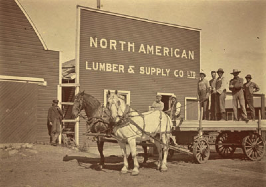|
Born December 20, 1837 in
Farmanagh County, Ireland, William Busby came to Canada when he was
eleven years old.
Margaret Ann Ferguson was nineteen when she married William Busby. They
were to have eight children.
William, caught the "go west" fever that spread over Ontario and hit
the trail in 1878.
In 1880 he secured a homestead north of Gladstone. William secured
lumber, built houses, schools, churches, and founded Orange
Lodges. In 1883 he moved to a homestead just north of Indian
Head, Saskatchewan. After years of drought, William looked eastward.
The C.P.R. line was nearing Manitoba. In 1888 he again uprooted his
family, walking with the cows from Indian Head to the Lambton
settlement in Manitoba, behind the family and the oxen.
He homesteaded on the southeast quarter of 22-7-27 where he farmed
until the railway came, at which time he moved to Reston and opened the
first lumberyard there. The first load of commercial products delivered
to Reston by rail was a load of lumber for their lumberyard.
The original Busby homestead on the south half of 20-7-27 was in the
Busby name for generations
The first lumberyard became Pioneer Lumber, in 1893. It was on the east
side of Third Street and to the west of what is now the Klusen Block.
The business was taken over by Mr. H. McBain who conducted it until
1907. He sold the business then to W. A. Brady who at that time had
only an implement business in a small building where he later built the
Brady Hardware.
Adapted from Trails Along the Pipestone, page 542
Adapted from Pioneers of the Pipestone. page 23
A Manitoba Success Story

Photo from the Manitoba Archives
In 1906, Edward A. Konantz, owner
of Citizen’s Lumber Company of Bow
Bells, North Dakota, joined forces with Charles Lee, appointed as
General Manager, and started North American Lumber and Supply Company
(Limited).
The conditions for the establishment of a lumber company were
excellent, with a strong economic climate and the building of the Grand
Trunk Railway across the Prairies offering the means by which outlets
could be supplied.
The partners opened their first lumberyard in Rivers, Manitoba, in
1907. By the fall of 1908, the partners had established 16 more yards,
with a total of 19 yards in place by the spring of 1909.
North American Lumber suffered through the Great Depression along with
the rest of Canada, with the rural yards hit the hardest, but by 1936,
56 yards had survived the worst part of the depression.
Through the ‘40s and ‘50s, North American Lumber continued to grow and
diversify, meeting the ever changing needs of post-war society, and
purchasing several yards in Saskatchewan and rural Manitoba. In 1948,
North American Lumber opened the Carberry yard. In 1954 the company
purchased the Minnedosa yard from the Valley Lumber company and the
Brandon yard from Wade Lumber. The pre-fabrication plant that began in
the 1940s in Winnipeg prospered, as the demand for housing in Canada
increased. North American Lumber made a great contribution through the
extensive development of the “Ezy-Built” business- garages, cottages,
homes and farm buildings. The company also diversified into the
construction industry with the founding of a new division – Ready-Mix
Concrete. nal-history-photo3
In 1966, North American Lumber and Supply Company (Limited) and
Citizen’s Lumber Company (Limited) amalgamated to form North American
Lumber Limited.
The mobile and modular home industry expanded throughout the ‘60s and
‘70s to meet an increasing need for housing in rural areas. North
American Homes Sales continued to serve this market with sales offices
in Lockport, Brandon, Reston and Warren.
Today the company employs over 200 people in a variety of related sales
and service companies including North American Lumber, North American
Homes Sales, Ready-Mix Concrete, and Pre-fab Truss factory. We
celebrated our 100th anniversary and maintain our commitment to growth
and diversification.
Adapted from The North American Lumber Co. Website
http://www.northamericanlumber.ca/our-company/history
|





